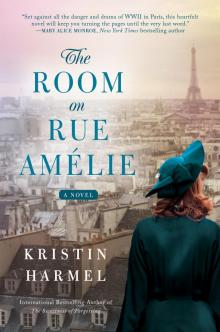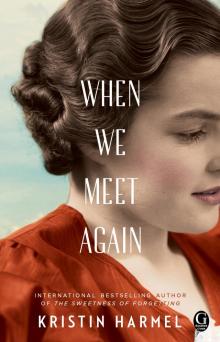- Home
- Kristin Harmel
The Room on Rue Amélie Page 19
The Room on Rue Amélie Read online
Page 19
“Already?”
“It has a space to hide pilots inside the apartment. The landlord is one of us. He’ll be able to help if you ever need assistance. You have to go as soon as possible.”
“Well.” Ruby forced a smile. “I suppose we’d better pack, then.”
“I’ll leave you to it. I’ll send some fellows to help you with your things the day after tomorrow, if that’s agreeable.”
“Yes, fine,” Ruby said. “Thank you.”
He disappeared out the door before she could say anything else.
“You’re worried about him finding you,” Charlotte said softly when Aubert was gone. Ruby had been standing in the center of the living room, staring off into space, for at least a minute.
“Who?”
“Thomas. The pilot.”
Ruby began to protest, but Charlotte merely shook her head.
“I think he felt that way about you too,” she said. “And he’ll come back. My parents will too. You just have to believe.”
Ruby forced a smile, but instead of the words making her feel better, they made her feel worse. She had her doubts that Charlotte’s parents were coming back at all—and of course the chances she’d see Thomas again were slim. But she could deal with only so much heartbreak in one day, so she put an arm around the girl and said brightly, “What do you say we begin packing? We have a lot of work ahead of us.”
TWO DAYS LATER, THE CONTENTS of Ruby’s life in Paris were stuffed into boxes, the old apartment stripped bare. The surge of grief Ruby felt looking around at the emptiness was unexpected; her life in Paris had begun here, and it had been Marcel’s family home for generations. But the Benoit family was gone now, and she wasn’t meant to be a part of it anymore. It was time to go.
“How will my parents find us when they get out?” Charlotte asked as they waited for the men Aubert had promised to send.
“I will stop back a few times a week,” Ruby promised, “and Aubert will have people checking too. Don’t worry, Charlotte. We’ll know when they return.”
“I can go back to check on the apartment too.”
“No. We can’t risk anyone seeing you.”
Charlotte hung her head. “So that’s it? I have to just disappear and become someone else?”
“In order to survive, yes.”
Charlotte sighed. “We can’t even go to my apartment now to get some of my things?”
Ruby was about to say no, but she hesitated. Charlotte couldn’t be seen entering or leaving the apartment. But what if Ruby went in? If anyone tried to stop her, it would be easy to explain; she could just sheepishly say she was checking for valuables; she would look like someone trying to take advantage of the poor Dachers’ misfortune. She knew such things had happened across Paris, though she hadn’t heard anyone entering the Dachers’ apartment. “I’ll try, Charlotte. What would you want, if I can only retrieve a few things?”
Charlotte brightened. “My blue dress, please. The one with the yellow ribbon. It’s hanging in my wardrobe. One of my father’s sweaters, please, and my mother’s silk gloves, which she always keeps in the third drawer of their dresser, tucked toward the back. And my mother’s anniversary ring too; it’s gold with a few small diamonds. It should be on the dressing table, in a small blue box.” Charlotte paused, and Ruby’s heart ached at the realization that the poor girl had been thinking about this for days. “And one or two of the framed photographs from the living room, if it’s not too much to ask.”
“I’ll do my best.” Ruby slipped out into the hallway, said a cheerful hello to Madame Colin from the second floor, who was just leaving the building, and then used Charlotte’s key to unlock the Dachers’ door. She was so intent on making it into the apartment undiscovered that it took her several seconds to register what she was seeing once she was inside.
“Oh no.” She gazed around in dismay. The place had been torn apart from top to bottom. The beautiful velvet sofa and chairs were slashed open. Pale spaces on the wall loomed ugly and empty. Books had been pulled from the shelves and destroyed, and all of Madame Dacher’s china was missing from the ornate cabinet in the corner.
Ruby’s eyes filled with tears. She and Charlotte hadn’t heard anyone breaking into the apartment, and the door was intact, so the thieves must have had access to a key—most likely from the landlord or the concierge. It made Ruby nauseated to think of neighbors lying in wait to take advantage of the family. Had one of them reported the Dachers to the police in the first place? Was there someone in this building who was directly responsible for their deportation?
Pulse pounding, Ruby slipped into the kitchen, which was equally destroyed, and then into the bedroom of Madame and Monsieur Dacher. The bed was stripped bare, and all that remained on the dresser top were rings of dust. Still, there were some clothes dangling from hangers in the closet, so she quickly rifled through until she found a scratchy wool sweater that had belonged to Monsieur Dacher. She couldn’t imagine why someone would have left it when winter clothes were at a premium, but perhaps their hands had already been full of other valuables.
Madame Dacher’s silk gloves and anniversary ring were gone, of course, though Ruby dutifully searched for them. In the end, she settled for a silk blouse that had been hidden between two plain cotton dresses. In Charlotte’s small room, she found more destruction, and it appeared that the blue dress the girl had asked for was missing as well. Ruby hastily chose two cotton dresses instead; she suspected they’d been hand-sewn by Madame Dacher, and she could make the argument to Charlotte that they had more sentimental value. There were no family pictures anywhere; they’d surely been taken for the value of the silver frames that held them.
She grabbed a couple of Charlotte’s books and then headed back to her own apartment, closing the door forever to a sad piece of the past.
“Did you get the things I asked for?” Charlotte asked.
“You know,” Ruby said carefully, “I think your mother must have taken her anniversary ring and gloves with her. And that blue dress you mentioned? The more I thought about it, the more I realized how impractical it would be. You’ll need everyday dresses. I got one of your papa’s sweaters, though!” She handed the armful of belongings to Charlotte, who looked disappointed. “I also brought a few of your books.”
“And a family photo?” Charlotte asked quietly.
“Oh, I thought perhaps that wasn’t a good idea,” Ruby replied. “What if someone searches our new apartment and finds it? Besides, I feel sure that your parents will be back in no time. You won’t need a photo to remember them by.”
Charlotte bit her lip. “The apartment was looted, wasn’t it?”
Ruby hesitated. “Yes. I’m so sorry.”
“There are truly terrible people in this world.”
Ruby pulled Charlotte into a hug. “But there are good people too. And I like to think that in the end, the good ones outnumber the bad.”
Charlotte let herself be held for a moment before pulling away. She moved to the window and looked out for a long time without saying a word. Ruby didn’t interrupt her; she knew that the girl needed to say good-bye in her own way.
THE NEW APARTMENT WAS IN a nice building on the rue de Lasteyrie in the Passy district, a thirty-minute walk across the river. The neighborhood, though close to both the busy Avenue Foch and the bustling Avenue des Champs-Élysées, was quiet and residential. In fact, the street had much the same feel as the rue Amélie.
The landlord, a man named Georges Savatier, was there to greet them when they arrived. “You must be our new tenants, Fleur and her cousin Hélène,” he said, smiling brightly. “Come, come, we must get you settled.” He was perhaps a decade older than Ruby, with a deep voice, a substantial waistline, and a big, bushy black mustache, which seemed at odds with his very bald head. His smile was wide and jolly, and Ruby liked him immediately.
He showed them to an apartment two flights up, explaining, as they walked, that the building didn’t have a lift but that h
e knew they were young and healthy and hoped they’d be comfortable. “Our second floor is also our quietest,” he said, giving Ruby a meaningful look. “You have no neighbors.” He stopped in front of apartment C and smiled. “This will be you. Apartments A, B, and D are vacant.”
“What happened to the people who used to live there?” Charlotte asked.
Monsieur Savatier frowned as he turned the key and opened the door. “They left some months ago in the middle of the night. Perhaps to the countryside.” He gave Ruby a quick look. Had the previous owners been rounded up in the recent raids too?
Ruby and Charlotte followed him inside. It was immediately obvious that the apartment was half the size of the place they’d come from, but it had a nice terrace that overlooked a private courtyard.
“My favorite part of the apartment,” Monsieur Savatier said, beckoning toward one of the two doors in the back. “Come, I will show you.” He led them into a tiny room with one small window. “This, I think, will be the master bedroom,” he said.
Ruby was about to protest that it would hardly fit a bed when his smile widened and he pointed toward the wall on the left. “I understand that you are in need of some discreet storage space.”
He put his hand on a panel of the wall just above waist level. He pushed gently up and in, and the wall slid open, revealing a crawl space large enough for a man to sit up comfortably. “Voilà,” Monsieur Savatier said. “In case you need to store anything here.”
“It’s perfect,” Ruby said, exchanging looks with Charlotte. It was larger than the hall closet in the old building, and it was also a more secure hiding spot, concealed within their own apartment. It would be much easier to slip pilots in and out without being observed. The wall space above it was filled with cupboards and cabinets; it was designed in a way that made it appear the entire wall was used for storage.
“Yes, I thought so,” Monsieur Savatier said. “I built it myself. I cannot do much to help; I manage several buildings, and I’m sure there are eyes on me. But this, in a small way, is my contribution.” He pointed up and added, “I live just two floors above with my wife. We are both here to help if you ever need us. Below you, the apartments are mostly deserted too, so you won’t have to worry about prying eyes. And of course there’s no concierge.”
“I don’t know how to thank you,” Ruby said.
“Don’t thank me yet. I haven’t told you the bad news. The building next door, which I also manage, has several Nazi officers as tenants. So you are living very close to them. But I think they do not suspect a thing.”
BY LATE EVENING, AUBERT’S FRIENDS had delivered their furniture and belongings, and Charlotte and Ruby had begun to make the cramped new apartment feel like home. There were more boxes to unpack, but Ruby could see Charlotte’s eyelids drooping. “Why don’t you go to bed?”
Charlotte yawned. “But there’s still so much to do.”
“It will all be here in the morning. It’s been a long day.”
Charlotte nodded and headed into the larger bedroom. They had determined it would be hers; having her stay in such close proximity to young pilots wouldn’t be appropriate.
“Thank you,” Charlotte said, pausing at her doorway and looking back to the living room, where Ruby sat at the small table in the corner.
“You don’t need to thank me for anything.”
“But I do. You didn’t have to bring me with you.”
“Charlotte, you’re my family now,” Ruby said firmly. “I wouldn’t have it any other way. Now get some sleep. Everything will look better in the morning.”
CHAPTER TWENTY-EIGHT
January 1943
By the beginning of 1943, food was scarcer than ever, but Ruby and Charlotte were surviving. They had helped eight pilots since moving into the new apartment, and though there was still no word about Charlotte’s parents, the girl seemed to have reached some kind of peace within herself.
At night, Charlotte and Ruby would sit together with an oil lamp burning between them and talk about the pilots they’d saved, wondering how many had made it back to England or America, how many had returned to the skies. They made up vivid stories of the men they’d known only briefly. An American fighter named Earl Johnson, for example, had stayed with them in August, and now they imagined him flying missions over western Germany, shooting Nazi aces out of the sky. A British bomber named Jay Cash had been their guest for almost a week in October, and they had convinced themselves that he was now the one dropping bombs on Nazi-run factories in the Paris suburbs.
In the first week of the new year, they hosted an RAF pilot named Jon Payne, who stared long and hard at Ruby on his first night with them. “I’m sorry,” he said when she caught him looking for the third time. “You just remind me of someone.”
“Who?”
He cleared his throat. “It’s rather foolish, but there’s a fellow in my squadron who was shot down a little over a year ago and helped by an escape line through Paris. He and I roomed together for a little while. He’d have these nightmares, and he’d yell out a name over and over again. When I finally asked him about it, he said he couldn’t talk about the specifics of the escape line—of course that’s one of the rules—but that there was a woman in Paris who had helped him. He told me a bit about her; he thought she was extraordinary. He didn’t realize he was calling out her name, of course. But the way he described her, she sounded just like you.”
“Like me?”
The pilot nodded. “Yes. She was American too, just like you are, and beautiful. But of course you go by Fleur.”
“And what name was he calling out?”
“I’m not sure I should say.”
Ruby nodded and waited. Surely there were other women around Paris helping on the line. And wasn’t it far more likely that the pilot in question was calling out the name of the gorgeous Laure?
“Well,” Jon said after a moment, “all of you go by code names anyhow, don’t you?”
“You’re right, of course.”
“It was Ruby,” Jon said. “The name he said over and over was Ruby.”
Ruby felt her whole body go numb. She reminded herself that the pilot could have been anyone, but she hadn’t used her real name with anyone else, with the exception of Dexter, the first refugee to show up at her door. “Who was the pilot?”
“I suppose I’d better not tell you his surname. But no harm in telling you his first name. It was Thomas. Do you know a Thomas?”
Ruby swallowed hard. “Perhaps.”
That night, Ruby lay in bed, wide awake and staring at the ceiling. The man Jon had mentioned had to be Thomas, her Thomas. But did this really mean he was thinking of her the way she was thinking of him? Or merely that she’d played a role in the most terrifying ordeal of his life? Still, the fact that he’d described her as extraordinary and beautiful, well, that was something.
The next morning, before Laure was due to arrive, Ruby pulled Jon aside. “This Thomas friend of yours,” she said. “He’s all right?”
“He’s just fine, miss. The nightmares are gone, and he’s returned to flying missions over France.” He paused and leaned in conspiratorially. “Though I think he still has a soft spot for the girl he was dreaming about.”
Ruby blinked a few times. “Well, when you get home, would you tell him that Ruby is fine? And that perhaps she thinks of him from time to time as well?”
Jon grinned. “I’d be happy to pass along the message, Fleur.”
Laure came to retrieve Jon just before noon. After he’d gone, Ruby kicked herself for not asking more. Had Thomas been injured in his escape from France? Had he run into any trouble? But to have appeared too interested would only have invited questions she couldn’t have answered. She’d have to rest assured in the knowledge that Jon would make it back to Britain safely and would pass along her message. He’d known who she was, and Thomas would too. Furthermore, now Thomas would know that she had moved and that he should be looking for someone named Fleur if
he ever returned.
But then, two weeks later, Ruby and Charlotte received some terrible news. “Philippe asked me to tell you that several pilots and one of the leaders of the escape line were arrested in Urrugne last week,” Monsieur Savatier told them grimly. “They’re all being questioned now. One of them was the pilot who was here just a couple of weeks ago, Payne. There’s a real worry that one or all of them will talk and that the line will be blown.”
“What will happen to them?” Ruby managed, although she was reeling from the news.
“The pilots will be sent to POW camps in the east. As for the French and Belgians accused of helping them? Tortured for information, most likely. Then executed.”
Ruby nodded. Of course she’d known; after all, it had been Marcel’s fate too. It just reminded her anew of the stakes—and of the danger she was putting Charlotte in.
“Philippe wanted me also to tell you that you won’t hear from him for a while,” Monsieur Savatier said. “Nor will you receive any pilots. Just try to live normally. There’s no reason to think that this portion of the line has been compromised yet.”
“But if it has?”
Monsieur Savatier frowned. “I will do what I can to protect you and your cousin. But you need to be ready to run at a moment’s notice.”
FOR DAYS, RUBY AND CHARLOTTE waited. What was happening to the pilots who were shot down over Belgium and northern France in the meantime? Were they wandering around in the freezing wilderness, wondering why no one was coming to their aid? Or had they found refuge with sympathetic farmers and villagers who knew better than to send them on to Paris until they’d received an all-clear?
Despite herself, Ruby worried constantly about Thomas too. Jon Payne had said that Thomas had returned to the skies over France, but what if he was shot down again? What if he tried to get to Paris to find her? What if he made it to her old apartment building only to realize she was gone?
And so three weeks after her work on the line had ground to a halt, Ruby roused Charlotte early on a Saturday morning. “Would you like to go for a walk?”

 The Room on Rue Amélie
The Room on Rue Amélie The Winemaker's Wife
The Winemaker's Wife The Forest of Vanishing Stars
The Forest of Vanishing Stars The Book of Lost Names
The Book of Lost Names Italian for Beginners
Italian for Beginners After
After How to Save a Life
How to Save a Life The Blonde Theory
The Blonde Theory The Sweetness of Forgetting
The Sweetness of Forgetting When We Meet Again
When We Meet Again Life Intended (9781476754178)
Life Intended (9781476754178)